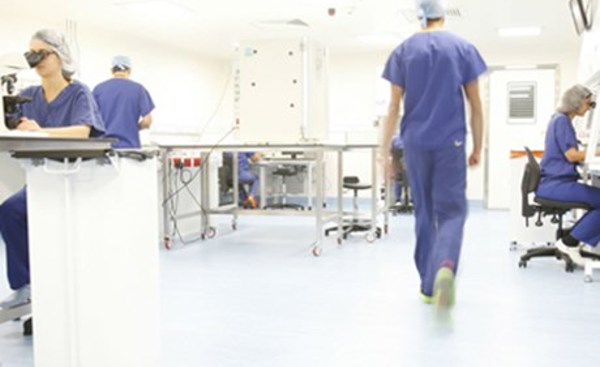Scientific Research
Our approach focuses on the quality of eggs, not the egg quantity.

We provide women-friendly treatment that delivers better health outcomes for mothers and babies.
On-going studies
Time-lapse is a method that enables continuous digital observation of embryo division in the IVF laboratory. This technology allows for detailed analysis of embryo development without having to remove the cells from their controlled environment in the incubator. The time-lapse technique makes it easier to see if the embryo intended for transfer has undergone the entire developmental phase correctly. Through this continuous monitoring of embryo development, we believe it is possible to increase the chances of selecting an embryo that can result in a pregnancy. Livio has just completed a randomized prospective multicenter study where the time-lapse technique was investigated. The study results are currently being analyzed and will be published in a scientific journal.
Recently, an artificial intelligence (AI) system has been developed for the analysis of embryo development. AI uses time-lapse images from the entire early embryo development to identify patterns corresponding to embryos with the highest likelihood of resulting in pregnancy. Livio Göteborg recently participated in a retrospective study to further develop this AI system in collaboration with Sahlgrenska University Hospital and Vitrolife. Time-lapse images from 6,000 developing embryos were analyzed in relation to pregnancy outcomes.
Livio Göteborg will now participate in a large multicenter study (the VISA study) where AI technology will be further examined. The purpose of the study is to investigate whether AI technology, compared to traditional embryo analysis, can better identify embryos with the highest chance of resulting in pregnancy.
The aim of the study is to determine whether the introduction of the time-lapse system can improve outcomes for children at birth compared to children born from embryos cultured in a traditional incubator and children conceived spontaneously. The study is being conducted at Livio Göteborg, but data comes from several clinics.
Livio Stockholm and Livio Falun are participating in the study together with several university hospitals. The main coordinator is Uppsala University, Professor Agneta Skoog Svanberg, and Senior Consultant Evangelia Elenis.
The study examines medical and psychosocial aspects of self-chosen, single parenthood through sperm double or embryo donation. How do the women feel during treatment and in their parenthood? How do those who do not achieve parenthood feel? How do the children feel and develop? The women and children will be followed until the children are seven years old. The control group consists of women in heterosexual couples undergoing IVF with their own gametes. We hope that this study will provide more knowledge on how best to support all family constellations and, through its results, contribute to improved routines in maternal and child health care as well as childcare.
The study is being conducted at Livio Kungsholmen and examines effects on biochemical and coagulation variables in connection with IVF. During hormone stimulation for IVF, hormone production changes so that estrogen levels rise to higher levels than under normal circumstances for a few weeks. The risk of venous thromboembolism (VTE) is increased during pregnancy and even more so after IVF. Our goal is to minimize the risk of VTE and to be able to identify at-risk mothers even before pregnancy, but also to detect induced risk early through biomarker monitoring in order to provide prophylactic treatment. This is of great clinical and scientific significance and is important for the prediction, prevention, and treatment of estrogen-induced thromboembolism.
The study is called “ProFET,” where Pro stands for Progesterone, the medication given as post-treatment, and FET stands for Frozen Embryo Transfer. In frozen embryo transfer during a natural menstrual cycle, where spontaneous ovulation has occurred, it is currently unknown whether progesterone treatment improves the chance of becoming pregnant and giving birth. Nevertheless, this treatment is given at several clinics, which may be unnecessary and burdensome for the patient. We now want to conduct a study to determine whether the administration of progesterone after frozen embryo transfer in a natural menstrual cycle increases the chance of pregnancy and live birth.
The principal investigator for the project is the Reproductive Medicine Unit at Sahlgrenska University Hospital, and several Livio clinics are participating in the study.
The study is being conducted at Livio Umeå. It investigates how the immune system is modulated by exposure to male antigens. The first part of the study involves women waiting for treatment with donated sperm. Before and after treatments with donated sperm, the immunological environment is studied both locally in menstrual blood and in peripheral blood. The primary focus is on changes in NK cells from the uterus, but several other types of immune cells and changes in various blood signaling substances are also studied.
CHORD: CHOosing the Right Donor
The study is being conducted at Livio Umeå. It examines whether certain combinations of KIR and HLA-C in donors and recipients are associated with better pregnancy outcomes. If so, such factors could be considered in donor selection in the future.
Our research
The Livio Group has through its own, non-profit company within the Livio Group and was started in 2008 with the aim of initiating and coordinating research and development, such as clinical multicenter studies and the introduction of new advanced technology, within the group. The research company has, in addition to coordinating a number of studies within the group, also arranged courses for gynecologists in IVF.
About our research
Since 2024, Livio has been a proud part of IVI RMA, which is a world leader in research and innovation in reproductive medicine, with over 1,900 scientific publications and a global network of more than 300 researchers and specialists. Through continuous development of new treatment methods and advanced technology, we, together with IVI RMA, set new standards for successful fertility treatments and offer evidence-based solutions with the best chances of pregnancy for patients all over the world.

Competence
All clinics within the Livio Group have employees with experience in research and development. Many doctors and embryologists have formal research qualifications in the form of doctoral degrees and associate degrees, and many more have participated in research studies conducted at the clinics.
The majority of embryologists and midwives within the Livio Group are certified according to ESHRE requirements. By participating in national and international meetings and courses, all employees (doctors, midwives, nurses, embryologists, administrative staff) can increase their competence in the field. Close contact and cooperation between the clinics in the group facilitates competence development - we learn from each other.
 The clinics within the Livio Group all have a solid background in IVF but with slightly different profiles and sizes. Several clinics also have many years of successful experience in research and development within IVF, and there is continuous work to transfer innovations and experiences between the clinics. Examples of this are quality work, data management, methods for hormone stimulation, laboratory methods such as vitrification of egg cells and blastocysts, etc. All clinics also benefit from genetic expertise.
The clinics within the Livio Group all have a solid background in IVF but with slightly different profiles and sizes. Several clinics also have many years of successful experience in research and development within IVF, and there is continuous work to transfer innovations and experiences between the clinics. Examples of this are quality work, data management, methods for hormone stimulation, laboratory methods such as vitrification of egg cells and blastocysts, etc. All clinics also benefit from genetic expertise.
What is high quality fertility care?
The large number of treatments performed in private clinics in Sweden shows that society only meets this demand to a limited extent. The advantages of private IVF include the fact that the staff at these clinics work exclusively with infertility treatments, and most have done so for many years. The staff group is very stable, with many remaining in their positions for a long time. The clinic’s team is cohesive and has a shared policy for handling different situations, which provides a sense of security and continuity even if you do not meet the same person at every visit.
Developments in IVF are rapid, and thanks to short decision-making paths, a private clinic can quickly implement new knowledge and technology. Several clinics working closely together can evaluate new methods more quickly. In the development of quality work and ISO certification of IVF clinics in Sweden, private clinics have been pioneers. All of this means that a private IVF clinic is very well positioned to meet the demands for the best care and the highest quality IVF treatment.

Types of research
Research projects can be conducted at various levels and require different resources. In all cases of research involving patients, approval from the Ethics Review Board is required, and in some cases, from the Medical Products Agency.
The highest level of evidence comes from studies that are prospective (planned in advance) and randomized (random allocation), where a detailed protocol is developed and strictly followed. If the question is whether one method yields better pregnancy outcomes than another, a so-called power analysis must be performed to determine how many patients are needed for statistical significance. Generally, such studies require several hundred patients, making them very resource-intensive. Therefore, many clinics are often involved in such a study, known as a multicenter study. Most studies of new hormones for stimulation are prospective, randomized multicenter studies, which are usually funded by pharmaceutical companies.
Prospective controlled studies, where a control group is compared with a treatment group but without random allocation, have somewhat lower evidence value. These types of studies are generally conducted at individual clinics.
The lowest level of evidence comes from so-called retrospective studies, where one examines after the fact how one method or another has worked. In this case, databases are reviewed and results compared. Depending on how accurate the data entry has been and how uniform the treatments were during the period, the results will be more or less reliable.
Follow-up studies are important in IVF but are generally retrospective. For example, after introducing a new freezing method for blastocysts, one can not only check how many women have children but also follow up on the children's health in both the short and long term.
Registry studies are a form of retrospective research involving large patient populations. In Sweden, as in many other countries, there are registers of all IVF treatments performed. With special permissions, outcomes of various treatments can be studied, for example in relation to the woman's age.
The Livio Group's clinics and Livio Research have been and continue to be involved in all of the aforementioned types of research.

Target groups for our research
There has been a shift in the causes for infertility treatment over the past 30–40 years. Initially, only fallopian tube damage was an indication for IVF. With the introduction of microinjection (ICSI) in the early 1990s, male infertility became a major group that could be treated. In recent years, hormonal disorders in women, especially ovulation problems, have also been treated. Unexplained infertility is treated with IVF even when investigations have not clearly identified a cause. The reason is that the outcomes are good, and the IVF method can help diagnose problems with fertilization and embryo development, as well as allow for the selection of embryos with good potential.
Many couples wait a long time before trying to conceive, and “female age factor” is now a common cause of infertility. Developing better methods for this group to increase the chances of pregnancy with IVF is a major challenge for the future. The reproductive genetics methods described above for IVF seem promising, but are currently not permitted in Sweden except in research studies.
Lifestyle factors also affect fertility and IVF outcomes. Overweight and smoking are known factors that reduce the chances. What about food? More studies are needed here, but it is likely that the quality of what we eat is important. Through studies in epigenetics, we know that certain substances in food can affect how our genes are read by influencing genome methylation. This fascinating field of research is expanding rapidly and will hopefully help us provide more specific lifestyle advice that can increase the chance of pregnancy in the future.
Although IVF outcomes have improved significantly over the years, not all couples succeed, even after repeated attempts. The challenge here is to identify the reasons why these couples do not succeed with conventional treatment and to tailor a method specifically for them.
Another challenge is women with reduced ovarian reserve due to age.
A third challenge is men with extremely poor sperm quality, or even absence of sperm in the semen. Within the Livio Group, we are working successfully with MicroTESE in these cases.
These are examples of important target groups where further research is needed.
Collaborations
The clinics within IVI RMA and the Livio Group have active collaborations with each other, as well as with several university hospitals and clinics both in Sweden and internationally. The clinics also collaborate with companies that manufacture technical equipment and media for IVF, as well as with various pharmaceutical companies in studies of new hormones used for stimulation during IVF.
Ethical aspects of research
Developments in assisted reproduction have progressed rapidly since the first child was born in the world, and today both male and female infertility can be successfully treated in most cases.
Studies and consent
The Livio Group offers all approved treatment methods in reproductive medicine in each country of operation.
However, a prerequisite for the methods to be applied in clinical practice is that they are first tested in each individual local laboratory, which is also an obvious part of our quality work. For each study, approval is first obtained from the Ethics Review Board. All patients who are relevant for the study are then informed both verbally and in writing. In order for the patient to participate in the study, written consent is finally required to be submitted to the clinic.
The requirement that a medical procedure must be preceded by informed consent is given great importance in medical ethics. In IVF, according to the National Board of Health and Welfare's regulations, consent is always required for so-called embryo transfer, insemination and cryopreservation of embryos.


